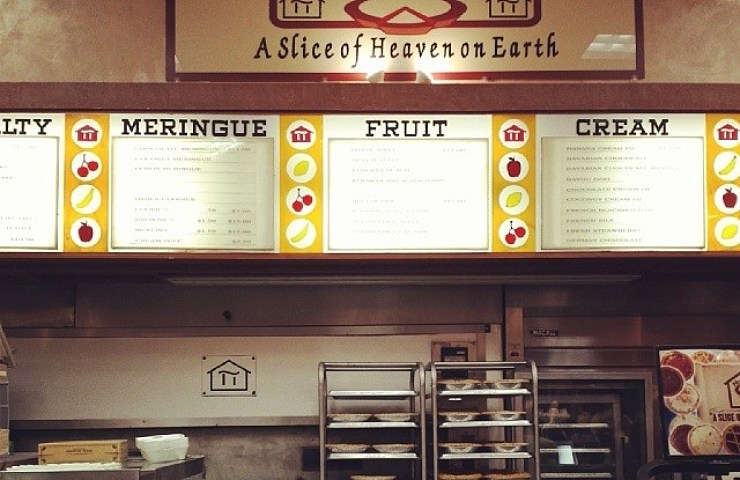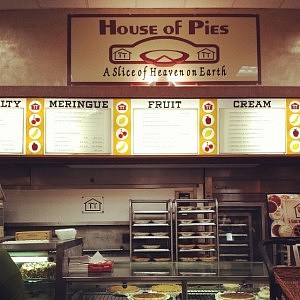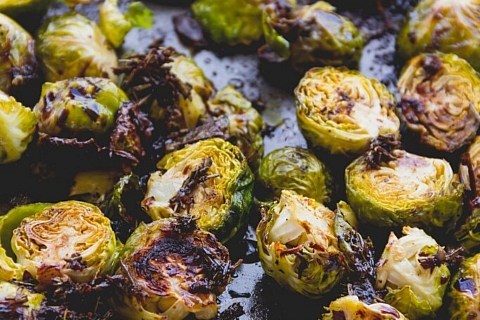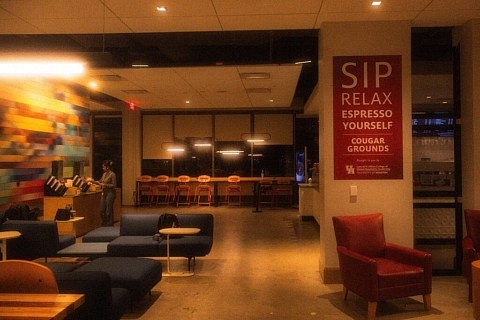Scientist, scholars and clergy alike have for centuries agreed on one fundamental principle of existence: Pie is essential to happiness.
That’s not mere hypothesis. ‘Tis truth—and historically evident.
When George Washington chopped down the cherry tree, you know damn well it was to claim a bowl of Morellos to take to his grandmother’s kitchen for their ruby red tartness.
And perhaps the most mystifying force in the Universe, the reason we know the area and volume of all of things spherical, that incomprehensible infinity of digits that we all pretty much (except the math majors, you endearing nerds) just round up to 3.14, was named after the other most mystifying force—pie.
Our sources say that some prodigious mathematician actually discovered the number pi while attempting to measure the circumference of a strawberry rhubarb (which, at House of Pies, is of the sweeter variety and definitely better if you can get the waiter to warm it up). That’s a true story but, for the sake of our credibility, don’t look it up.
The people behind Houston’s beloved House of Pies understand this axiom. Because what is a house without a pie?
Empty, because the inhabitants are at the neighbor’s, gnawing on a decadent slice of coconut cream or lemon merengue. Disclaimer: Your neighborhood House of Pies serves both of these, but they may not be served at your actual neighbor’s. Cooglife does not condone breaking in to find out. We will not vouch for you and we will not represent you in court. So stop calling us, Dave.
In an eatery scene dominated by tacos and pho, the restaurant, whose original location is a 24-hour old-timey diner on Kirby that also happens to feel brand new thanks to a kitchen fire a few years ago, has grown into a cultural symbol for many in Houston, but especially for college students.
But why? Are we born with an innate desire for triple pecan fudge? Or did the pecan draw us out of our study-crazed shells? House of Pies presents the typical chicken-or-the-egg scenario—and while I haven’t tried their poultry, I would not suggest ordering the latter as benedict; the Hollandaise sauce is, on the whole, unremarkable.
Whatever the cause, it is rare to find a university student who has not graced the diner, even if they’ve only been to the lesser Westheimer location. This raises one other question of import. What is the correlation between the University of Houston’s rise to glory and the House of Pies’s rise to fame in the student consciousness?
Let me posit this: The House of Pies is not just a reason for student success. It is, in fact, the only reason.
You don’t believe? The proof is in the pudding, which is also available for a small fee if for whatever reason you bring along a piteous friend who doesn’t want to try the seasonal favorite, pumpkin (or the seasonal non-favorite, mincemeat).
In this study, we must remain aware that correlation does not necessarily prove causation. There are other tests which statisticians know of that can do this. For the record of full disclosure and journalistic integrity, I must disclose to you now that I will not utilize those; Instead, I will employ the FOX News approach—to simply write as much convincing jargon as possible until the reader has been sufficiently confused and accepts the argument.
Let us first establish the variables. College students can be defined as caffeine-crazed, sweatpants-wearing, non-showering and sleep-deprived overgrown toddlers. Pie is, obviously, the work of a divine being (I’ll not pretend to speak for other religions but in Christianity this is represented in its triangular shape—a figuring of the Holy Trinity).
And their similarities? College students stay up at all hours of the night. Pie, too, is served at 3 a.m., 4 a.m, 5 a.m. and so on. This was fact-checked multiple times by our editors—not because we just wanted to go, but because we felt you deserved your delicious, due diligence.
This is where the similarities end. But this is fortunate, because we have now proven that pies are not human. Thus, it is morally acceptable and desirable to eat them.
While House of Pies was first created in 1965, pie has been around for centuries. It originated with the Ancient Egyptians and has been documented as a Roman delicacy, too, which would make it both Eastern and Western if any of the modern and, frankly, racist connotations of those words were used back in those days. Luckily, history evidences they were not.
But history does prove that pie predates college students. Before the first university was founded in Fez, Morocco, the doughy pastry had been consumed for hundreds of years. Which means that all student success is, in some way, due to pie. Right?
Right. But let’s get back to the present. If we wish to decide that pie decides a student’s success, then we must define success. To some, that might mean a job or an internship or a lot of money or a family. In general, we could say that success is happiness.
And what was our original truth? Pie is essential to happiness.
Now, we return to our math majors to proof this. If pie is essential to happiness and we define student success as, generally and only, happiness, then pie is essential to student success. It’s called the law of syllogism, and it’s used all the time in politics to pull bullshit arguments together by a string.
But enough of all that. If there is one thing to take away from this case study, it is that House of Pies is open all day and night. Which means that it is open right now. And that the Bayou Goo, the city’s signature pie, is waiting.






Recent Comments